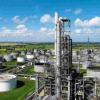Hi all,
i am chemicl eng student..am doing design of coalescer..my professor asked me to do dynamic simulation of coalescer..i dnt knw to do..pls help me...
|
|

Coalescer Design
Started by robinpv4u, Oct 13 2012 12:38 PM
5 replies to this topic
Share this topic:
#1

Posted 13 October 2012 - 12:38 PM
#2

Posted 15 October 2012 - 09:43 AM
Hi Robin
For your help, try to search in this forums about the subject that you want to design.
For dynamic simulation, I think that you first of all must design the static equipment. For this one source is the GPSA Data book the Section 7 about Separators, and then the subject for 3 Phase Separators.
Good luck!
For your help, try to search in this forums about the subject that you want to design.
For dynamic simulation, I think that you first of all must design the static equipment. For this one source is the GPSA Data book the Section 7 about Separators, and then the subject for 3 Phase Separators.
Good luck!
#3

Posted 21 October 2012 - 02:54 AM
What kind of coalescer do you refer to? There are liquid-gas or liquid-liquid coalescers, based on mechanical or electrostatic means, to obtain emulsion separation through droplet merging, http://en.wikipedia.org/wiki/Coalescer. Concerning liquid-liquid coalescers, attached "coalesc.pdf" (from web) can give some introductory info.
At least here, coalescer design seems to be a "black box" for us. For instance, we had requested a coalescer as part of an oily condensate treatment unit in a refinery ( http://www.cheresources.com/invision/topic/15931-boiler-feed-water-as-cooling-medium), but package supplier had the expertise and would be responsible for it. We only gave the specific gravity range of hydrocarbon (oil) droplets (not even their size).
As Profe suggests, you have to find specific data in literature or web, while dynamic behaviour could be developed after expressing the steady state mathematically.
At least here, coalescer design seems to be a "black box" for us. For instance, we had requested a coalescer as part of an oily condensate treatment unit in a refinery ( http://www.cheresources.com/invision/topic/15931-boiler-feed-water-as-cooling-medium), but package supplier had the expertise and would be responsible for it. We only gave the specific gravity range of hydrocarbon (oil) droplets (not even their size).
As Profe suggests, you have to find specific data in literature or web, while dynamic behaviour could be developed after expressing the steady state mathematically.
Attached Files
Edited by kkala, 21 October 2012 - 02:59 AM.
#4

Posted 22 October 2012 - 12:51 AM
thnks profe and kkala for your valuable info.... expecting this kind of help in future also.... we are asked to do a project as a part of curriculum... can you help me to fix a topic which is innovative....
#5

Posted 30 October 2012 - 03:38 PM
Choice of a topic usually depends on your interests and the Instructor. In the older times the instructor fixed the topic and you had to chose among the available instructors' topics. Now there may be more freedom to chose. although this is limited in case of experimental work.
Interests and likes differ from person to person, something personally liked will create more motivation. If I were a student, I would chose a subject that
α. includes experiments to try something different than theory (pilot plant or device would be even better).
β. is not quite innovative, since this may mean less available data; for instance a solid settler / decanter or a hydro cyclone for a specific service would be preferable to a coalescer.
γ. would need combined knowledge from several courses, for instance not only flow of fluids or corrosion rates, since a lot of our engineering tasks require this combination.
δ. Instructor's reputation also plays a role. But all above opinions are personal / subjective.
Interests and likes differ from person to person, something personally liked will create more motivation. If I were a student, I would chose a subject that
α. includes experiments to try something different than theory (pilot plant or device would be even better).
β. is not quite innovative, since this may mean less available data; for instance a solid settler / decanter or a hydro cyclone for a specific service would be preferable to a coalescer.
γ. would need combined knowledge from several courses, for instance not only flow of fluids or corrosion rates, since a lot of our engineering tasks require this combination.
δ. Instructor's reputation also plays a role. But all above opinions are personal / subjective.
#6

Posted 20 November 2012 - 01:00 AM
kk thanks.. pls suggest some such topics for me sir...
Similar Topics
Design Capacity Of Hydrogen Pullet During Hydroprocessing Units UpsetStarted by Guest_Divid Kelin_* , 18 Jun 2025 |
|

|
||
Hot Oil Loop / Heating Medium DesignStarted by Guest_Lyne_* , 30 Mar 2024 |
|

|
||
Hello, Design Of Natural Gas Liquefaction Processes.Started by Guest_guoyinyanliner_* , 18 Jun 2025 |
|

|
||
Scrubber DesignStarted by Guest_nasss_* , 07 Aug 2024 |
|

|
||
Refinery Lpg Deethanizer Column DesignStarted by Guest_Ilyes_* , 15 Feb 2025 |
|

|

 FB
FB










